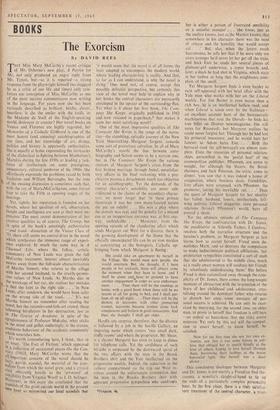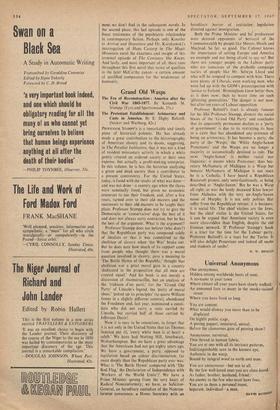Swan on a
A Study in Automatic Writing
Transmitted by Geraldine Cummins Edited by Signe Toksvig Foreword by C. D. Broad
`a very important book indeed, and one which should be obligatory reading for all the many of us who cannot yet bring ourselves to believe that human beings experience anything at all after the death of their bodies'
—PHILIP TOYNBEE, Observer, 35s.
The Life and Work of Ford Madox Ford
FRANK MacSHANE
`Well planned, sensitive, informative and sympathetic, a "must" for all who circle nostalgically—or compulsively—in the Pound—Joyce orbit.'
—CYRIL CONNOLLY, Sunday Times, Illustrated, 40s.
The Niger Journal of Richard and John Lander
Edited by Robin Hallett
This is the first volume in a new series entitled TRAVELLERS & EXPLORERS
`It was an excellent choice to begin with the Lander journal. Their discovery of the course of the Niger to the sea in 1830 was hailed by contemporaries as the most important discovery of the age. This journal is a remarkable compilation.'
—DOUGLAS JOHNSON, B'ham Post, Illustrated, 42s.
LI
es,KEEM PLWIL
Grand Old Wasps
The Era of Reconstruction : America after the Civil War 1865-1877. By Kenneth M. Stampp:(Eyre and Spottiswoode, 35s.) The Protestant Establishment: Aristocracy and Caste in America. By E. • Digby Baltzell. (Seeker and Warburg, 42s.)
PROFESSOR STAMPP'S is a remarkable and timely piece of historical • polemic. He has already made a great contribution to the historiography of American slavery and its doom, suggesting, in The Peculiar institution, that it was not a kind of resident missionary activity in which a white gentry created an ordered society at their own expense, but actually a profit-making enterprise. In this volume, he is less the historian analysing a given and dead society than a contributor to a present controversy. For the United States, today, is faced with the results of what was done— and was not done--a century ago when the slaves were nominally freed, but given no economic resources to use their freedom, and, after a few years. turned over to their old masters and the successors to their old masters to be taught their place. Professor Stampp does not try to give the Democratic or 'conservative' dogs the best of it and does not always carry conviction, but he has the best of the argument. What is the argument?
Professor Stampp does not believe (who does?) that the Republican party was composed solely of idealists or that it was committed to the abolition of slavery when 'the War' broke out. But he does note how much of its support came from people who thought there was a moral question involved in slavery, gave a meaning to The Battle Hymn of the Republic,' thought that abolition was a great moral gain in a country `dedicated to the proposition that all men are created equal.' And his book is not merely a discussion of reconstructfbn, but an analysis of the `trahison d'un parti,' for the 'Grand Old Party' of Lincoln's legend, the 'party of moral ideas,' puked up its principles' (to quote William James in a slightly different context), abandoned the Freedmen and, last year, nominated a candi- date who did not carry a state carried by Lincoln, but carried half of those carried by Jefferson Davis!
Now it is easy to be censorious, to forget that it is not only in the United States that (as Thomas Sancton put it), 'every white man is at heart a sahib.' We have had Notting Hill, Smethwick, Wolverhampton. But we have a great advantage that the Americans had not got eighty years ago. We have a government, a party, opposed to legislation based on colour discrimination, far more deeply than the Republican party ever was. What is 'The Battle Hymn' compared with 'The Red Flag,' the Declaration of Independence with `Workers of the World Unite'?. We have a
Primo AAinictpr sprung from the very heart of
Radical Nonconformity; we have, as Solicitor- General, an hereditary custodian of the Noncon- formist conscience; a Home Secretary with an hereditary horror of restrictive legislation directed against immigration.
Both the Prime Minister and his predecessor were devoted opponents of betrayal of the Commonwealth by people like Messrs. Heath and Macleod. So far, so good. The Cabinet knows the importance of setting Europe and America an example and not being afraid to spy so! But there are younger people in the Labour party who are conscious of the probable campaign tactics of people like Mr. Selwyn Lloyd and who will be tempted to compete with him. There were plenty of Liberals, even working men, who were fed up with the GOM's preoccupation with `justice to Ireland.' Birmingham knew better then, as it does now, than to 'waste time on such `glittering generalities.' The danger is not now, but after ten years of Labour opposition. Professor Baltzell's tract is already famous for he, like Professor Stampp, dissects the social biases of the 'Grand Old Party' and concludes that its apparently permanent decline as a 'party of government' is due to its restricting its base to a caste that has abandoned any pretence of being an aristocracy. It has become a party, the party of the 'Wasps,' the 'White Anglo-Saxon Protestants' and the Wasps are no longer a majority or automatically destined to rule. The term 'Anglo-Saxon' is neither racial nor linguistic: it means white Protestant; thus Sec- retary McNamara of Michigan is a Wasp but Senator McNamara of Michigan is not since he is a Catholic. I have heard a Republican Roosevelt protest, only semi-facetiously, at being described as 'Anglo-Saxon.' But he was a Wasp all right, as was the lately deceased 'Klan lawyer from Alabama with the very un-Anglo-Saxon name of Murphy. It is not only politics that suffer from the Republican retreat; it is business; it is social life. The chief victims' are the Jews, but the chief victim is the United States, for it can be argued that American society is even more class-ridden than English, despite the old Etonian network. If Professor Stampp's book is a tract for the time for the Labour party, Professor Baltzell's is a tract for the Tories. It will also delight Proustians and indeed all snobs and students of snobs!
D. W. BROGAN
Universal Anonymous
One anonymous, Hidden. among worldwide hosts of men; A no-name in your town Where almost all your years have slowly walked; An unnamed face to many in the smoke-stained street Where you have lived so long.
You are content.
What would dismay you more than to be displayed On highlit public stage, A posing puppet, unnatural, unreal, Before the clamorous gaze of passing show?
Anonymous, universal, Thin thread in human fabric, You are at one with all its intricate patterns, Indistinguishable save to the keenest eye, Authentic in the warp, Bound by integral woof to earth and man.
You are anonymous—but not to all.
By the few well-loved ones you are close-loved, As father, brother, husband, friend:
An PnPmy to the feu/ whn mutt have fn..c
You are to them a personal name,
Separate, individual—a man. DAVID BA FENIAN
We'd better all learn the lyrics of the old 'Red Flag' And wait until we drop down dead.
A likely story Land of Hope and Glory, Wait until we drop down dead.
SIMON RAVEN
The Khrushchev Ouster
Russia After Khrushchev. By Robert Conquest. (Pall Mall Press, 35s.)































 Previous page
Previous page